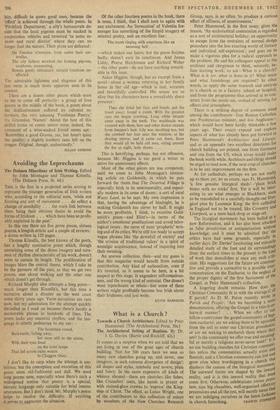Avoiding the Leprechauns
The Dolmen Miscellany of Irish Writing. Edited by John Montague and Thomas Kinsella. (The Dolmen Press, 9s. 6d.) Tips is the first in a projected series aiming to represent the younger generation of Irish writers who, according to the editorial note, 'while not forming any sort of movement . . . do reflect a change of sensibility . . . the main link between them being their obvious desire to avoid the forms of Irishism . . . which have been so profit- ably exploited in the past.'
In this one there are five prose pieces, sixteen poems, a longish article and a couple of reviews: a dozen writers in 120 pages.
Thomas Kinsella, the best known of the poets, has a lengthy ruminative poem which, though containing some of the dense imagery and sure- ness of rhythm characteristic of his work, doesn't seem to sustain its length. The proliferation of images blurs the central theme, which I take to be the pressure of the past, so that we get two poems, one about walking and the other one which doesn't get through.
Richard Murphy also attempts a long poem— much longer than Kinsella's, but this time a narrative about a disaster on the west coast some thirty years ago. Verse narratives are rare now, but my admiration for the attempt quickly dwindled as I read on because there's hardly a memorable phrase in hundreds of lines. The poem lacks any essential rhythm, and the lan- guage is utterly pedestrian to my ear:
The boatsmen rowed,
Backwards, falling away, her stem still to the storm, With their eyes fixed on the faint lamps That led across calm waters to Cheggan Quay.
I don't like to carp when the attempt is am- bitious, but the conception and execution of this poem seem old-fashioned and dull. We need long poems now, especially when there's such a widespread notion that poetry is a special, hieratic language only suitable for brief intense utterances. But I don't think Mr. Murphy's poem helps to resolve the difficulty. If anything it serves to aggravate the situation. Of the other fourteen poems in the book, there is none, I think, that I shall turn to again with any excitement. An 'Invocation' of Valentin Ire- monger has something of the limpid imagery of oriental poetry, and an excellent line:
The room ringing with emptiness like an unswung bell . . .
—which makes one listen; but the poem finishes badly, doesn't earn its conclusion. And James Liddy, Pearse Hutchinson and Richard Weber —the other poets—do not have anything remark- able in this issue.
Aidan Higgins, though, has an excerpt from a novel—about a woman returning to her family home in her old age—which is taut, accurate and beautifully controlled. His senses are so alive that his characters have a remarkably sharp presence:
Then she dried her face and hands, put the towel away, found a comb. With the greatest care she began combing. Long white strands came away in the teeth. The washbasin was covered with them, hers and other darker strands from Imogen's hair. Lily was moulting too, but she combed her hair near the window, at the shaving mirror, and it came out there. Soon they would all be bald old men, sitting around the fire at night, holy shows. . .
This is horrifying, perhaps, but not offensive, because Mr. Higgins is too gqod a writer to strive for unnecessary effects.
Most of the other pieces are less competent, until we come to John Montague's interest- ing article on Goldsmith, in which he puts forward the thesis that The Deserted Village is especially Irish in its sentimentality, and especi- ally modern in its sense of doom : a sort of rural Waste Land, as he says. My own impression is that, having the advantage of hindsight, he is making Goldsmith too clever by half. It might be more profitable, I think, to examine Gold- smith's poem—and Eliot's—in terms of the author's emotional predilections and avoid teleo- logical issues: the curse of most 'prophetic' writ- ing and of its critics. We're still too ready to accept vague phrases like 'the downfall of society' and 'the erosion of traditional values' in a spirit of nostalgic acquiescence, instead of inquiring into their meaning.
An uneven collection, then—and my guess is that this magazine would benefit from outside contribution. Any kind of nationalism, even if it's inverted, as it seems to be here, is a bit suspect at this stage. It engenders self-conscious- ness, and the wrong kind of restraint. One doesn't want leprechauns or rebels—but some of these writers might profitably become less Irish about their Irishness; and just write.
KEITH HARRISON






























 Previous page
Previous page